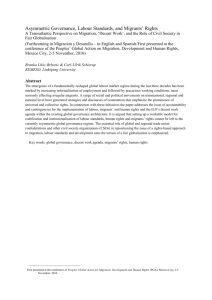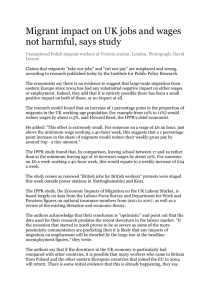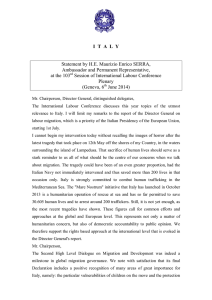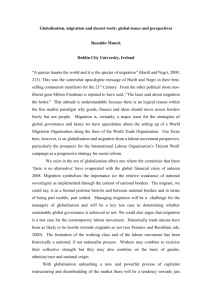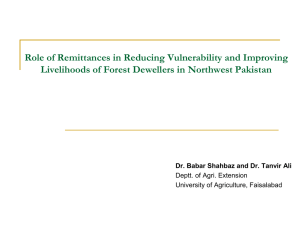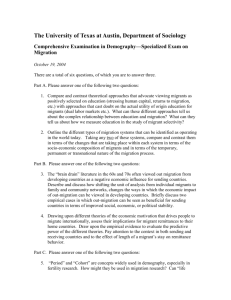Opening statement by Mr.Yoshiteru Uramoto
advertisement
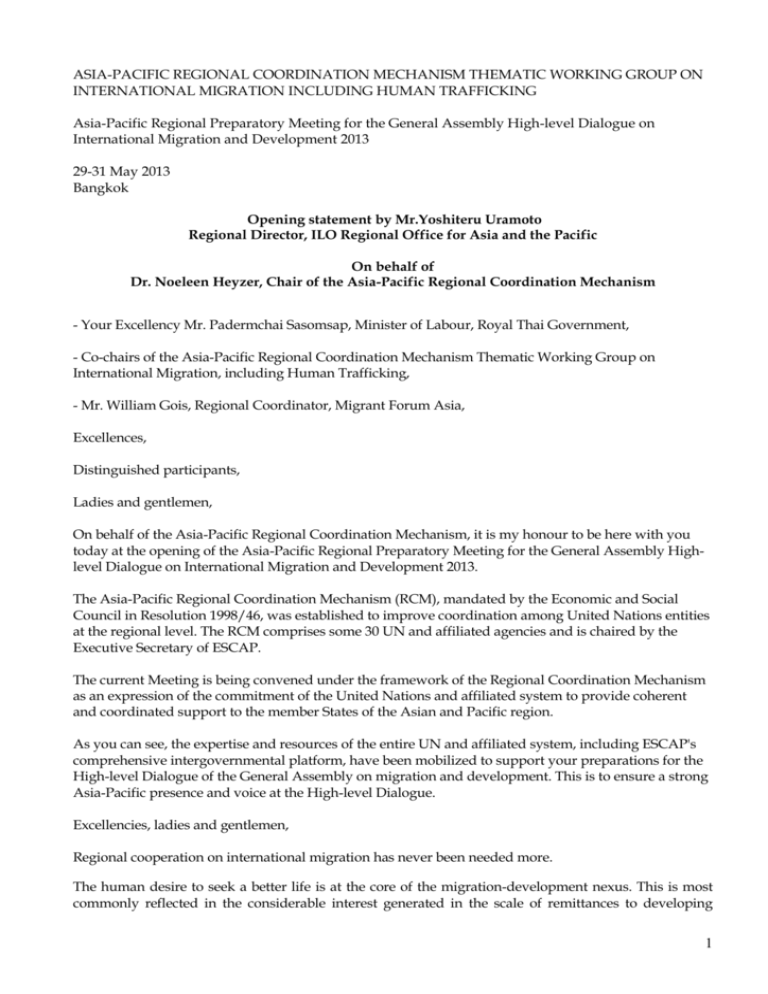
ASIA-PACIFIC REGIONAL COORDINATION MECHANISM THEMATIC WORKING GROUP ON INTERNATIONAL MIGRATION INCLUDING HUMAN TRAFFICKING Asia-Pacific Regional Preparatory Meeting for the General Assembly High-level Dialogue on International Migration and Development 2013 29-31 May 2013 Bangkok Opening statement by Mr.Yoshiteru Uramoto Regional Director, ILO Regional Office for Asia and the Pacific On behalf of Dr. Noeleen Heyzer, Chair of the Asia-Pacific Regional Coordination Mechanism - Your Excellency Mr. Padermchai Sasomsap, Minister of Labour, Royal Thai Government, - Co-chairs of the Asia-Pacific Regional Coordination Mechanism Thematic Working Group on International Migration, including Human Trafficking, - Mr. William Gois, Regional Coordinator, Migrant Forum Asia, Excellences, Distinguished participants, Ladies and gentlemen, On behalf of the Asia-Pacific Regional Coordination Mechanism, it is my honour to be here with you today at the opening of the Asia-Pacific Regional Preparatory Meeting for the General Assembly Highlevel Dialogue on International Migration and Development 2013. The Asia-Pacific Regional Coordination Mechanism (RCM), mandated by the Economic and Social Council in Resolution 1998/46, was established to improve coordination among United Nations entities at the regional level. The RCM comprises some 30 UN and affiliated agencies and is chaired by the Executive Secretary of ESCAP. The current Meeting is being convened under the framework of the Regional Coordination Mechanism as an expression of the commitment of the United Nations and affiliated system to provide coherent and coordinated support to the member States of the Asian and Pacific region. As you can see, the expertise and resources of the entire UN and affiliated system, including ESCAP's comprehensive intergovernmental platform, have been mobilized to support your preparations for the High-level Dialogue of the General Assembly on migration and development. This is to ensure a strong Asia-Pacific presence and voice at the High-level Dialogue. Excellencies, ladies and gentlemen, Regional cooperation on international migration has never been needed more. The human desire to seek a better life is at the core of the migration-development nexus. This is most commonly reflected in the considerable interest generated in the scale of remittances to developing 1 countries, but where it can be too easily forgotten that these monies are sent to families and communities by millions of migrants who work very hard every day. It is also expressed in the linkages between migration, employment and social protection, and the need to gain an improved understanding of their impact on economic and social development in countries of origin, transit and destination, including how the labour and skills of migrants fill labour market demands in countries of destination. And the numbers of international migrants in employment are hardly insignificant. In fact, the International Labour Organization (ILO) estimates that over 50 per cent of the 214 million international migrants today are economically active, a figure that is much higher if their family members are also counted. Moreover, almost half of the total international migrant population are women, migrating increasingly for employment on their own account, and an estimated one in eight are between the ages of 15 and 24, thus highlighting the diverse labour market profiles of international migrants in this globalized world. Broadly speaking the movements that take place in the Asia-Pacific include: temporary labour migration; permanent migration; irregular migration; and forced migration including asylum seekers and refugees. Asia generates and hosts the largest number of refugees world-wide. It holds almost 30 per cent of the global population of concern to UNHCR, approximately 9.5 million people. Economic growth, labour shortages, demographic changes and wage differentials among countries of origin and destination continue to drive labour migration within and from Asia. Labour migration in the Pacific is characterized by seasonal worker programs and a move towards labour mobility in the framework of trade agreements. Many of us in this room are aware of the development contribution that migrant workers make to their host and origin countries - in the form of services and competitiveness in countries of destination and financial flows in countries of origin. Migration helps to improve the quality of life of many migrants and their families. Many migrants are filling a niche in the national labour markets by doing jobs that nationals do not want or cannot fill. Nevertheless many migrant workers and their families are subject to labour exploitation and abuse. Host societies are often reluctant towards the immigration of lower skilled workers. Unauthorized migration is fairly widespread. The protection of jobs for nationals is an understandable policy concern. Developing the right policy and legislative response that balances the different interests and effectively governs migration is a relatively complex and difficult process, particularly whereas admission policies are concerned. Politicians and policy-makers face a sensitive and challenging task in making the case for the need for foreign labour and the positive impacts on society these migrants bring. The rights and freedoms stipulated in international human rights law developed under the auspices of the UN system apply equally to migrant men and women as to any other individual, as do the provisions of international labour law developed by the ILO, including those in the eight fundamental ILO Conventions. It is also imperative that countries ensure some minimum standards of protection, including the basic human rights, for all migrants workers, whatever their status. At different international forum on international labour migration in Asia, namely the tripartite plus ASEAN Forum on Migrant Labour (AFML), the inter-state Abu Dhabi Dialogue covering the Gulf Cooperation Council and South and South-East Asia, and Colombo Process, recommendations on concrete actions towards “effective recruitment practices and regulations” and “improving the recruitment process” have been a top item on the agenda. Meanwhile emerging national practices have included efforts to regulate sub-agents and develop a rating mechanism (Sri Lanka), the development of codes of conduct for its members by associations of recruitment agencies (Vietnam), and G to G recruitment (MOUs with the Republic of Korea). In both the Australian and New Zealand seasonal 2 workers programs, employers and agents are prohibited from charging costs to the worker. ILO research in Vanuatu found that seasonal workers have become important agents of economic change in their communities. However there is some disruption to social and family structures. The most recent ILO Convention, C189 on Decent Work for Domestic Workers recognizes domestic work as work and provides a historic opportunity to make decent work a reality for domestic workers. The Philippines has been among the first in the world to ratify the convention. Thailand and Singapore have recently enacted a new regulation on domestic work that extends some of the provisions of the convention to domestic workers. Countries in the ASEAN are moving towards free movement of professionals. The ASEAN is working on the completion of mutual recognition agreements in priority service sectors and subsequently the development of core competencies in these sectors by 2015. Well qualified and trained workers, aligned with requirements in destination countries, along with the certification that guarantees standards and quality is an important element of well managed labour migration - it benefits employers as well as it provides protection to the worker. This is an area requiring attention, including recognition of qualification and skills for returnees. Excellencies, distinguished guests, Social dialogue is essential to the development of sound labour migration policy. Cooperation at all levels (bilateral, regional and multilateral) between governments, trade unions and civil society, the employers organizations/private sector and other stakeholders is an essential pillar for ensuring the protection of migrant workers, and securing development benefits of labour migration. Cooperation is also key for countering all forms of intolerance and promoting social cohesion and inclusion through the economic and social participation of migrants as well as refugees. In concluding, and once again welcoming you, I would like to acknowledge the excellent work that has been put in by all member organizations of the Asia-Pacific Regional Coordination Mechanism Thematic Working Group on International Migration, including Human Trafficking, and the co-chairs, ESCAP and IOM, in preparing and organizing this important event, and I wish the conference all success. 3
